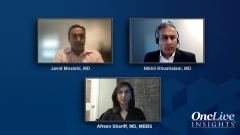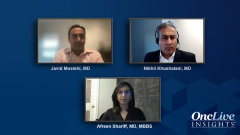
Immunotherapy-Related Diabetes in Melanoma: A Management Perspective
Afreen Shariff, MD, MBBS, discusses managing immunotherapy-related diabetes in melanoma, emphasizing the critical need to detect sudden changes in blood sugar levels and advocating for a multidisciplinary approach.
Episodes in this series

This is a video synopsis/summary of an OncLive Insights® involving Afreen Shariff, MD, MBBS; Javid Moslehi, MD; and Nikhil Khushalani, MD.
Khushalani asks Shariff how often she consults endocrinology for immunotherapy-induced type 1 diabetes (T1D) and when it should be done. She states T1D occurs in less than 1% of immunotherapy-treated patients, but she sees many cases. The key is recognizing abrupt hyperglycemia without recent steroids or type 2 diabetes history. Endocrinology should be urgently consulted to start insulin and avoid diabetic ketoacidosis given complete β-cell destruction.
Regarding additional management, studies are investigating agents such as teplizumab to salvage islet cells in early T1D. However, it remains unclear whether they will be approved for patients with cancer. Otherwise, endocrine toxicity should not preclude immunotherapy continuation with close monitoring/management.
For the presented patient with stage III disease, Shariff recommends resuming adjuvant therapy after diabetes optimization without holding treatment given lack of data that T1D increases other toxicity risks. Khushalani agrees this is typical practice at specialty centers, though community oncologists may admit patients before continuing immunotherapy.
Video synopsis is AI generated and reviewed by OncLive® editorial staff.




































